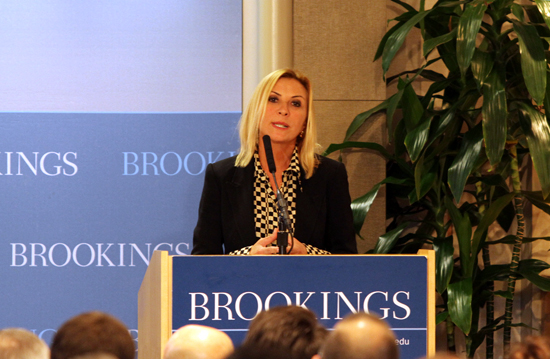
On December 4, The Brookings Institution hosted a discussion exploring U.S.-Turkish relations during President Obama’s second term.

Panelists included: Brookings Nonresident Senior Fellow Omer Taspinar; Kemal Kirisci of Bogazici University; and Soli Ozel of Kadir Has University. Brookings Managing Director William Antholis and Umit Boyner, chair of the Turkish Industry and Business Association (TUSIAD), provided introductory remarks. Director of the Center on the United States and Europe (CUSE) and Senior Fellow Fiona Hill moderated the discussion.
More information here: The Next Phase of the U.S. – Turkey Strategic Partnership.
During the event, The Brookings Institution and The Turkish Industry and Business Association (TUSIAD) announced the launch of the “TUSIAD U.S. – Turkey Forum at Brookings” and introduced Professor Kemal Kirisci as the “TUSIAD Senior Fellow.”
TUSIAD President Umit Boyner’s remarks:
“Good afternoon ladies and gentlemen.
The United States has had a historical election. It looked to us in Turkey and to much of the rest of the world that this was a critical election whose results would determine the path and tenor of American politics for perhaps decades to come. As a non-partisan observer of the American scene, I shared in the rejoicing of much of the world that President Obama won the elections. As a businesswoman I now expect a second term that will tackle chronic economic problems and get America’s fiscal house in order. The reason why I am so engaged with the ‘domestic’ affairs of the United States is pretty obvious. What happens here echoes in the rest of the world.
In foreign policy as well the world has expectation from the United States that cannot possibly be met. Yet one thing is certain and that is the world wants the US to be engaged and not turn inwards.
The world that we have been accustomed to is changing rapidly. Asia which was once treated as a ‘drama’ now is emerging as the new economic center of the world. The Middle East once thought of as immovable is going through a vibrant if difficult process of transformation. In international relations the so-called ‘swing states’ nowadays deserve closer scrutiny of their foreign policies and political preferences.
Turkey is one of these swing states. It is also a close ally of the United States. Our relations over the years had their ups and downs but in the final analysis we always came out of our crises together and determined to continue to cooperate.
During President Obama’s first term Turkish-American relations were upgraded, if that is the right term, from a strategic partnership to a model partnership. Although there were disagreements between the two capitals notably on the issue of Iran’s nuclear program and Turkey’s relations with Israel there was also a whole variety of issues that required close cooperation. Never was this cooperation more meaningful perhaps than in the aftermath of the Arab Awakening.
This profound transformation of the strategic, political and sociological landscape of the Middle East that will take a considerable amount of time to come to a conclusion needs our attention and our assistance. At a time when the United States is publicly committed to a pivot to Asia, the realities of the Middle East whether these be related to Iran, the desperate picture of the peace process, to the endgame of the Syrian conflict or to the avoidance of a sectarian war on a regional scale will continue to call upon a Washington. However reluctantly the United States, I believe, will have to engage.
That reality would be the framework within which Turkey and the United States can re-forge their
alliance, reassess their priorities and common interests and start devising a joint strategy and coordinate policies. In doing so we will need to be resourceful, perhaps think outside the box but first and foremost be very frank and open with one another. While Turkey will be asked to see America’s limits, the United States ought to listen to Turkey’s concerns and take its reservations and recommendations into account.
The panel today can be a good opening shot to start this discussion and the debate on how the next phase of Turkish-American relations will shape. I am looking forward to its deliberations.”
